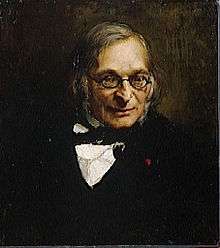Adolphe Franck
Adolphe Franck (1809 – 11 March 1893)[1] was a French-Jewish philosopher who specialised in Jewish mysticism.
Adolphe Franck | |
|---|---|
 Portrait of Adolphe Franck by Jules Bastien-Lepage, 1878 | |
| Born | 1809 |
| Died | 11 March 1893 |
| Nationality | French |
Notable work | La kabbale, ou, La philosophie religieuse des Hébreux |
| Region | France |
| Institutions | Collège de France (1854–1881) |
Main interests | Jewish mysticism |
Influences
| |
Early life
Franck was born in Liocourt in 1809.[2]:111 He originally studied to become a rabbi, but decided to become a philosopher instead as a protégé of Victor Cousin.[2]:111
Academic career
Franck was the first French Jew to receive an agrégation in philosophy, and had a successful academic career.[2]:111 He was a professor for "Droit de las nature et des gens" from 1854 until 1881 at the Collège de France.[2]:111
His most famous work was La kabbale, ou, La philosophie religieuse des Hébreux (The Kabbalah, or, the Religious Philosophy of the Hebrews), an 1843 work concerning Kabbalah and Jewish mysticism.[2]:111 He also edited an 1800-page dictionary called Dictionnaire des Sciences Philosophiques in 1844,[2]:111 and translated the Zohar into French.[3]
He served as president of the Société des Etudies Juives (Society of Jewish Studies) and was a frequent contributor of the Archives Israélites journal.[2]:111 At the age of 36, Franck was accepted into the Académie des Sciences Morales et Politiques.[2]:111
Mysticism
Franck was a strong opponent of atheism, favouring the study of mystics and alchemists, such as Paracelsus and Martinez de Pasqually.[2]:112 Towards the end of his life, he made close friends with Gérard Encausse, the founder of neo-Martinism.[2]:112
Peace activism
Franck was involved with the European peace movement as the president of Frédéric Passy's Société Française des Amis de la Paix (French Society of Friends of Peace) and a supporter of international arbitration efforts.[4]
Selected works
- La kabbale, ou, La philosophie religieuse des Hébreux (in French). Hachette. 1843.
References
- "Revue internationale de sociologie". Revue Philosophique de la France et de l'Étranger. 35: 559–560. 1893. ISSN 0035-3833. JSTOR 41075617.
- Huss, Boaz; Pasi, Marco; von Stuckrad, Kocku, eds. (2010). Kabbalah and Modernity: Interpretations, Transformations, Adaptations. Brill Publishers. ISBN 9789004182875. Retrieved 5 November 2019.
- Leff, Lisa Moses (2006). Sacred Bonds of Solidarity: The Rise of Jewish Internationalism in Nineteenth-century France. Stanford University Press. p. 170. ISBN 9780804752510. Retrieved 5 November 2019.
- "Personal Mention". American Advocate of Peace. 55 (6): 137. 1893. ISSN 2159-5089. JSTOR 27899917.